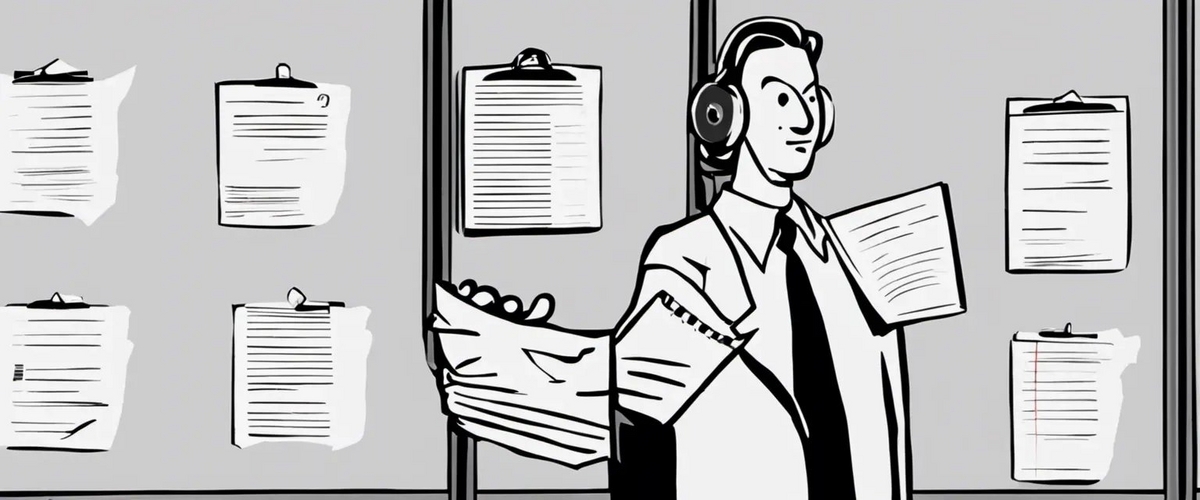
Chapter 1 To understand The Checklist Manifesto
The Checklist Manifesto is a book written by Atul Gawande, a surgeon and writer. Published in 2009, the book explores the importance of checklists in various professions, particularly in fields where complex tasks and decisions are involved.
Gawande discusses his personal experiences as a surgeon, as well as examples from other industries such as aviation, construction, and finance, to highlight the effectiveness of checklists in improving performance, reducing errors, and increasing overall efficiency. He argues that checklists serve as valuable tools to manage complexities and avoid critical mistakes, even for professionals who possess extensive knowledge and experience.
The book also delves into the psychological reasons behind the usefulness of checklists, explaining how they can help to combat uncertainty, handle unexpected events, and foster teamwork. Gawande emphasizes that checklists are not meant to replace expertise or judgment, but rather to augment them by ensuring crucial steps are not missed in high-stakes situations.
Overall, The Checklist Manifesto promotes the idea that through the proper implementation of checklists, professionals in any industry can enhance their performance and ultimately deliver better outcomes.
Chapter 2 Is The Checklist Manifesto worth the investment?
The Checklist Manifesto by Atul Gawande is generally considered a good book, receiving positive reviews from both critics and readers. It explores the importance and effectiveness of checklists in various fields, from medicine and surgery to aviation and construction. Many readers find the book informative and thought-provoking, as it offers practical insights on how checklists can enhance performance, improve outcomes, and prevent errors. Additionally, Gawande writes in an engaging and accessible manner, making complex concepts understandable for a wide range of readers.
Chapter 3 Introduction to The Checklist Manifesto
"The Checklist Manifesto" by Atul Gawande is a book that explores the power and effectiveness of checklists in various fields, particularly in professional settings such as healthcare, aviation, and construction. Gawande argues that checklists, when properly designed and implemented, can significantly improve performance, prevent errors, and save lives.
Gawande begins by discussing his own experiences as a surgeon and how he initially resisted using checklists in the operating room. However, he was convinced of their value after witnessing the success of the World Health Organization's Surgical Safety Checklist, which reduced major complications and deaths across various hospitals.
Gawande explores the history of checklists, highlighting their usage and impact in different industries. He demonstrates how checklists have been used in aviation to ensure safety and prevent pilot errors. He also discusses the construction industry, where complex building projects have been successfully managed by following structured checklists.
The book emphasizes the importance of simplicity in checklist design and implementation. Gawande argues that checklists should be concise, focused, and easy to use. They should contain only essential steps to avoid overwhelming users and maintain their effectiveness.
Gawande emphasizes that checklists are not meant to replace individual expertise but rather enhance it. By using checklists, professionals can ensure consistency, avoid skipping necessary steps, and reduce the likelihood of errors caused by human failure or oversight.
Furthermore, the book explores the challenges and barriers to implementing checklists effectively. Gawande discusses the resistance he faced from some colleagues who viewed checklists as unnecessary, redundant, or a threat to their autonomy. However, he provides examples of successful checklist implementation in various settings, proving their beneficial impact.
Gawande concludes by highlighting the universal applicability of checklists and the potential they hold in improving various industries. He encourages professionals from different fields to embrace the power of checklists and view them as a valuable tool for enhancing performance and reducing errors.
Overall, "The Checklist Manifesto" is a compelling exploration of the importance and effectiveness of checklists. Gawande provides clear examples and evidence to support his argument and makes a convincing case for the widespread adoption of checklists in professional settings.
Chapter 4 The Checklist Manifesto Author's Profile
The author of the book "The Checklist Manifesto" is Atul Gawande. He released the book on December 22, 2009.
Apart from "The Checklist Manifesto," Atul Gawande has written several other books, including:
- "Complications: A Surgeon's Notes on an Imperfect Science" (2002): This book explores the complexities of medical practice and shares real-life stories from the author's experiences as a surgeon.
- "Better: A Surgeon's Notes on Performance" (2007): In this book, Gawande delves into the concept of improvement, both in the medical field and beyond, focusing on various case studies and personal anecdotes.
- "Being Mortal: Medicine and What Matters in the End" (2014): In this critically acclaimed book, Gawande examines the realities of aging, mortality, and end-of-life care, questioning how medicine can provide assistance in graceful aging and dealing with mortality.
In terms of editions, there is no subjective "best" edition of Atul Gawande's books as they are not revised or re-released in multiple editions in the same way that novels often are. However, each of his books may have various editions based on factors such as paperback releases, audiobook versions, or international editions. It is recommended to check with book retailers or online platforms to find the specific edition of any particular book.
Chapter 5 Theme of The Checklist Manifesto
The Checklist Manifesto Meaning
The Checklist Manifesto by Atul Gawande is a book that explores the power and effectiveness of using checklists in various fields and industries, particularly in healthcare.
The meaning of the book revolves around the idea that checklists can be a simple yet highly effective tool to improve outcomes, enhance productivity, and prevent mistakes. Gawande argues that even experts can benefit from the use of checklists to ensure that important steps are not missed and to promote better teamwork and communication.
The book emphasizes the value of checklists in managing complex tasks and highlights their role in minimizing errors, saving lives, and improving overall performance. It also delves into the history of checklists and delves into their application in aviation, construction, and disaster response.
Ultimately, the meaning of The Checklist Manifesto is to promote the use of checklists as a practical approach to handling complex and high-stakes tasks, with the potential to enhance efficiency, reduce errors, and improve outcomes in various fields.
The Checklist Manifesto Theme
The theme of "The Checklist Manifesto" by Atul Gawande is the power and effectiveness of using checklists in complex and high-pressure situations.
Chapter 6 Extra Accessible Sources
- Amazon: The Checklist Manifesto: How to Get Things Right - This is the official page of the book on Amazon, where you can find information, reviews, and purchase options.
- Goodreads: The Checklist Manifesto by Atul Gawande - Goodreads provides a summary, ratings, and reviews by readers who have read the book.
- TED Talk: Atul Gawande: How do we heal medicine? - Atul Gawande's popular TED Talk where he discusses the importance of checklists in medicine and beyond.
- YouTube: The Checklist Manifesto Book Review - Various YouTube channels offer book reviews on The Checklist Manifesto, providing an overview and analysis of the book.
- The New Yorker: The Checklist - This is the original article written by Atul Gawande, which served as the inspiration for The Checklist Manifesto.
- NPR: Doctor's New Book Says The Checklist Saved Lives - An interview with Atul Gawande about the concepts and ideas presented in The Checklist Manifesto.
- The Guardian: The Checklist Manifesto by Atul Gawande - A book review from The Guardian, offering an in-depth analysis of the book's main themes and arguments.
- Harvard Business Review: The Right Way to Use a Checklist - An article by Atul Gawande published in the Harvard Business Review, which explores how checklists can improve various industries.
- LinkedIn: Influencer Post by Atul Gawande - Atul Gawande's post on LinkedIn where he discusses the success and impact of checklists in different fields.
- Medium: The Checklist Revolution - an article written by Atul Gawande on Medium, sharing his thoughts on the checklist revolution and how it can be applied in various domains.

Chapter 7 Inspirational Quotes from The Checklist Manifesto
The Checklist Manifesto quotes as follows:
- "Under conditions of complexity, not only are checklists a help, they are required for success."
- "Checklists seem lowly and simplistic, but they help fill in for the gaps in our brains and between our brains."
- "The volume and complexity of what we know has exceeded our individual ability to deliver its benefits correctly, safely, or reliably."
- "A good checklist is precise, efficient, and easy to use even in the most difficult situations."
- "The purpose of a checklist is not to supplant judgment but to enhance it."
- "Checklists remind us of the minimum necessary steps and make them explicit."
- "With a checklist in hand, brains don’t have to stretch to remember, spell out the minimum necessary step, or spell out the not smart to skip step."
- "Checklists have made a substantial difference in the quality and delivery of care in hospitals."
- "Good checklists are, above all, practical."
- "Checklists establish a higher standard of baseline performance for any given professional."
Chapter 8 Similar Books Like The Checklist Manifesto
- "Start With Why" by Simon Sinek: Since you enjoyed "Leaders Eat Last" by Simon Sinek, I recommend diving deeper into his work with "Start With Why." In this book, Sinek explores how some leaders and organizations inspire others to take action. He presents a powerful framework that showcases the importance of identifying and sharing your purpose, or your "why," and how it can drive success in both personal and professional environments.
- "Atomic Habits" by James Clear: Complementing your interest in productivity and efficiency explored in "The Checklist Manifesto," "Atomic Habits" by James Clear is an insightful read. Clear delves into the power of small habits and their ability to create significant changes in our lives. He provides practical strategies to build good habits, break bad ones, and enhance personal and professional productivity. This book offers actionable advice to help you streamline your routines and achieve better results.
- "Influence: The Psychology of Persuasion" by Robert Cialdini: If you want to explore the art of influencing and persuading others, "Influence: The Psychology of Persuasion" by Robert Cialdini is a must-read. Cialdini breaks down the principles underlying successful persuasion techniques, explaining how to leverage them ethically. Through research-based insights, he provides valuable knowledge applicable in various contexts, from personal relationships to business negotiations.
- "The Power of Habit" by Charles Duhigg: Continuing the theme of habits and their impact on our lives, "The Power of Habit" by Charles Duhigg is an enlightening exploration of the science behind habits. Duhigg delves into the neurological and psychological aspects of habit formation, explaining how we can harness this knowledge to make positive changes. This book offers fascinating stories, research, and practical tools to help individuals and organizations understand and transform their habits.
5."Creativity Inc." is an enlightening book that takes readers on a captivating journey into the realm of Pixar Animation Studios. Written by Ed Catmull, co-founder of Pixar, along with Amy Wallace, this book reveals the inner workings of one of the most successful and innovative creative organizations in the world.
Enjoy these thought-provoking reads as you delve deeper into the world of leadership, decision-making, habit formation, and personal growth!